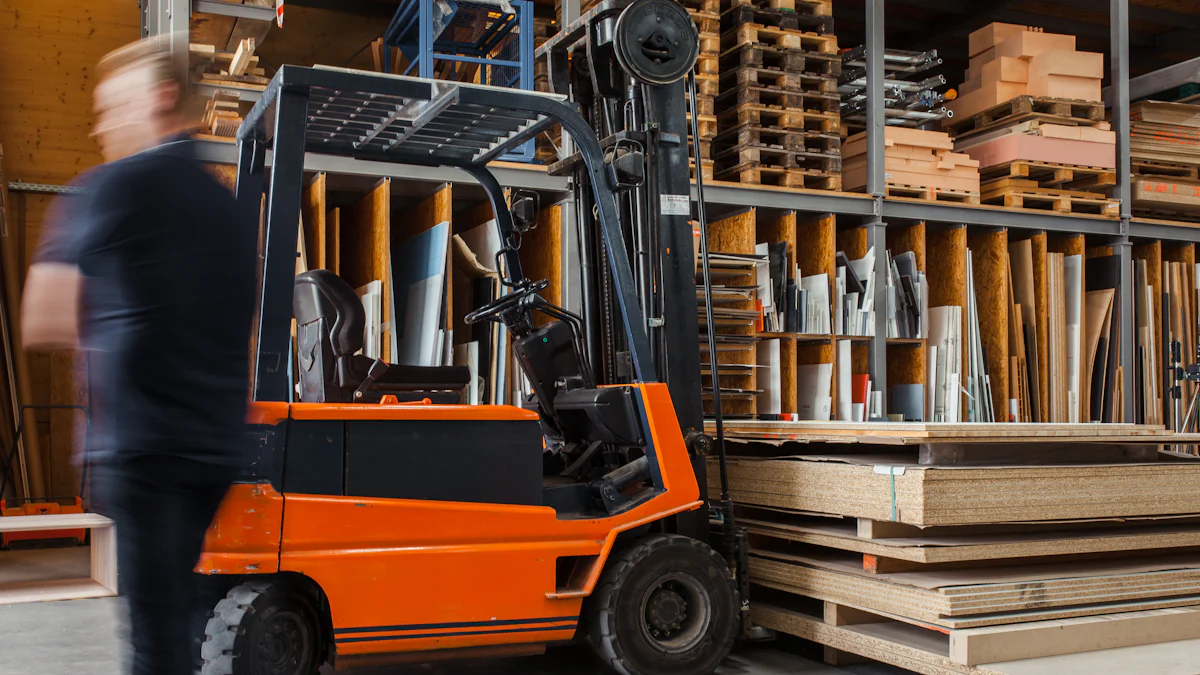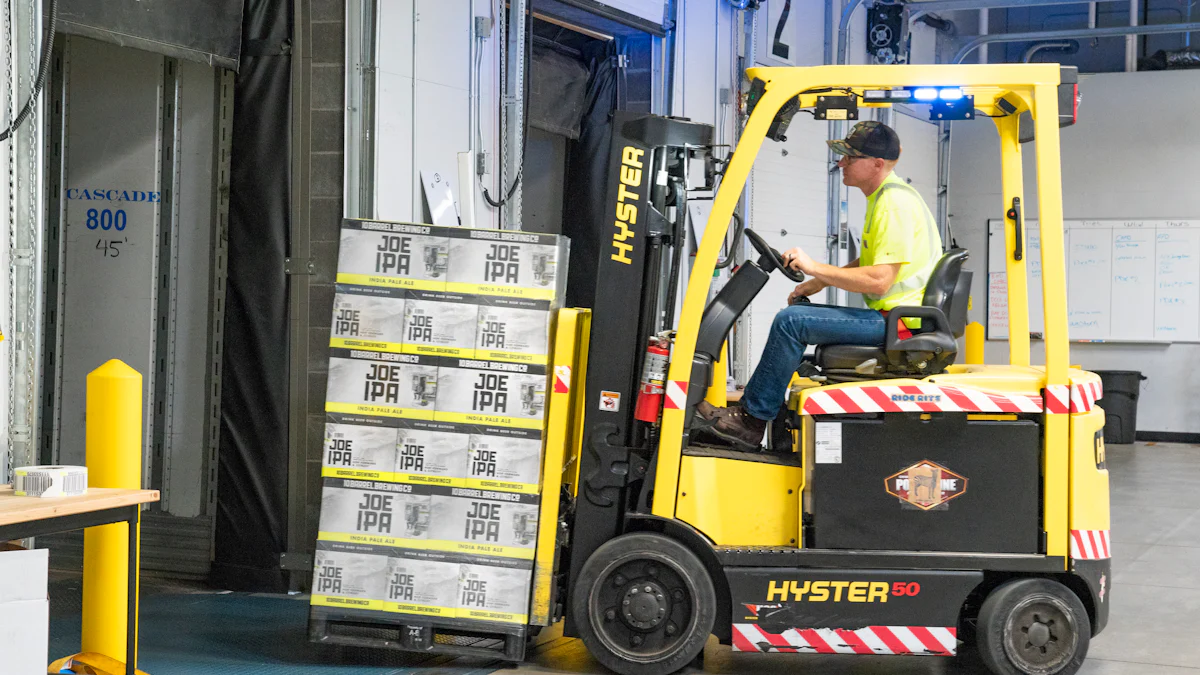
Enhancing warehouse operations is paramount, and selecting the best pallet jack is a critical decision. The right choice can boost productivity by up to 30%, revolutionizing loading and unloading tasks. Expert Shukla emphasizes how these pallet jacks streamline heavy cargo handling and internal goods movement, underscoring their pivotal role in warehouse efficiency. This blog will delve into the nuances of pallet jacks, guiding you through key considerations to make an informed choice.
Understanding Pallet Trucks
When it comes to pallet jacks, understanding their definition, purpose, basic components, and operational mechanisms is crucial for warehouse efficiency. Let’s delve into the intricacies of these essential tools.
Definition and Purpose
What is a Pallet Truck?
A pallet truck is a material handling tool designed to lift and transport pallets within a warehouse or storage facility. It typically consists of a set of forks that slide under the pallet, allowing for easy lifting and movement.
Why Pallet Trucks are Essential
Pallet jacks play a vital role in streamlining warehouse operations by simplifying the process of moving heavy loads. They are indispensable for loading and unloading goods efficiently, contributing to increased productivity and reduced manual labor.
Basic Components
Forks
The forks of a pallet jack are the two metal arms that extend outward to support the pallet. These sturdy components provide stability during lifting and ensure secure transportation of goods.
Wheels
Equipped with durable wheels, pallet trucks can smoothly navigate through warehouse spaces, even when carrying heavy loads. The wheels are designed for optimal maneuverability and ease of operation.
Handle
The handle of a pallet jack serves as the control center for operators. By engaging with the handle, users can lift, lower, steer, and position the pallet truck with precision, enhancing overall handling efficiency.
Operational Mechanism
Manual vs. Electric
When considering operational mechanisms, one must choose between manual and electric pallet trucks based on specific requirements. Manual pallet jacks rely on physical exertion for operation, making them suitable for lighter loads and shorter distances. On the other hand, electric pallet trucks utilize motorized systems for effortless handling of heavier loads over longer distances.
Incorporating these insights into your decision-making process will help you select the most suitable pallet truck for your warehouse needs.
Key Factors to Consider

Weight Capacity
Importance of Weight Capacity
Ensuring the appropriate weight capacity of a pallet truck is crucial for efficient warehouse operations. By selecting a pallet jack with a suitable weight limit, you can prevent overloading, which may lead to equipment damage or workplace accidents. It also contributes to maintaining a safe working environment by adhering to recommended load capacities.
How to Determine Required Capacity
To determine the necessary weight capacity for your pallet truck, assess the heaviest loads typically handled in your warehouse. Sum up the maximum weights of these loads to establish the minimum capacity required. Additionally, consider potential future load increases to accommodate evolving operational needs effectively.
Fork Dimensions
Length and Width
The dimensions of the forks on a pallet truck play a significant role in its functionality. Optimal fork length ensures stability when lifting various pallet sizes, while adequate width provides sufficient support for different load types. Choosing forks that align with your specific warehouse requirements enhances overall handling efficiency.
Compatibility with Pallets
Selecting pallet jack forks that are compatible with your existing pallets is essential for seamless operations. Ensure that the fork dimensions match the dimensions of your pallets to prevent slippage or instability during transportation. This compatibility minimizes product damage and optimizes workflow within your facility.
Lift Height
Standard Lift Heights
Understanding the standard lift heights required in your warehouse is key to selecting an appropriate pallet truck model. Evaluate the vertical space within your facility to determine the maximum lift height needed for loading and unloading tasks efficiently. Matching the lift height of the pallet jack to your operational requirements enhances productivity and safety measures.
Special Requirements
In some cases, warehouses may have unique demands that necessitate special lift height capabilities from a pallet truck. Consider any specific requirements such as elevated storage areas or customized shelving systems when choosing a model with adjustable lift heights. Addressing these specialized needs ensures smooth material handling processes tailored to your operational setup.
Flooring and Environment
Impact of Flooring Type
Concrete, as the primary flooring material in warehouses, significantly influences pallet truck operations. Uneven or damaged concrete surfaces can impede the smooth movement of pallet jacks, leading to operational inefficiencies. To mitigate these challenges, selecting appropriate flooring materials is crucial for optimizing warehouse productivity.
Environmental Considerations
Warehouse environments vary in temperature and humidity levels, directly impacting equipment performance. Extreme temperatures can affect the functionality of pallet trucks, potentially causing malfunctions or reduced efficiency. By evaluating environmental factors such as temperature control and moisture levels, warehouse managers can ensure optimal working conditions for their pallet handling equipment.
Types of Pallet Trucks

Manual Pallet Trucks
Manual pallet trucks are fundamental tools in warehouse operations, offering distinct advantages and limitations. Their simplicity and cost-effectiveness make them a popular choice for businesses seeking efficient material handling solutions.
Advantages
- Easy to operate without extensive training
- Ideal for small-scale warehouses with limited space
- Cost-effective initial investment compared to electric models
Disadvantages
- Limited load capacity for heavier items
- Manual operation may lead to operator fatigue over time
- Slower movement speed compared to electric counterparts
Electric Pallet Trucks
Electric pallet trucks represent a technological advancement in material handling equipment, providing enhanced efficiency and productivity benefits. These powered machines offer a seamless solution for transporting heavy loads across larger warehouse spaces.
Advantages
- Increased load capacity for handling heavier items effortlessly
- Electrically powered operation reduces manual labor requirements
- Enhanced maneuverability and speed for improved operational efficiency
Disadvantages
- Higher initial investment costs compared to manual models
- Dependency on battery charging cycles for uninterrupted operation
- Requires specialized training for safe and effective use due to electrical components
Specialized Pallet Trucks
In addition to manual and electric options, specialized pallet trucks cater to specific warehouse needs, offering tailored solutions for unique operational challenges. High-lift and low-profile pallet trucks are among the specialized variants designed to address distinct requirements.
High-Lift Pallet Trucks
High-lift pallet trucks feature extended lifting capabilities, allowing operators to reach elevated storage areas or racks efficiently. These specialized models are ideal for warehouses with vertical storage configurations that require precise positioning of goods at varying heights.
Low-Profile Pallet Trucks
Conversely, low-profile pallet trucks are engineered with reduced height dimensions, enabling easy access under low-clearance pallets or containers. These specialized tools are suitable for facilities with space constraints or where standard pallet jacks may encounter height restrictions.
The diverse range of pallet truck options available ensures that businesses can select the most suitable model based on their specific operational requirements, contributing to optimized material handling processes within their warehouses.
Choosing the Best Pallet Truck
Assessing Warehouse Needs
To make an informed decision when selecting the best pallet truck for your warehouse, it is crucial to assess your specific operational requirements thoroughly. By evaluating load types and considering the layout of your warehouse, you can streamline material handling processes effectively.
Evaluating Load Types
When assessing load types in your warehouse, consider the frequency and weight of the items being transported. Understanding the nature of your loads enables you to determine the appropriate pallet truck specifications required for efficient handling. By categorizing loads based on size, weight, and fragility, you can tailor your equipment selection to meet diverse operational demands.
Considering Warehouse Layout
The layout of your warehouse significantly influences the choice of a suitable pallet truck model. Analyze factors such as aisle width, storage configurations, and accessibility to loading docks when evaluating your facility’s layout. By aligning the features of the pallet jack with your warehouse design, you can optimize maneuverability and enhance overall operational efficiency.
Budget Considerations
Budget considerations play a pivotal role in selecting an ideal pallet truck that meets both operational needs and financial constraints. By examining initial costs and long-term maintenance expenses, you can make a cost-effective investment that aligns with your budgetary requirements.
Initial Costs
When evaluating initial costs, compare pricing options for different pallet truck models available in the market. Consider factors such as purchase price, installation fees, and any additional accessories or features included with the equipment. Opt for a pallet jack that offers a balance between affordability and functionality to maximize value for your investment.
Maintenance Costs
In addition to upfront expenses, it is essential to factor in maintenance costs associated with pallet trucks over their lifespan. Regular maintenance routines ensure optimal performance and longevity of the equipment, reducing downtime and repair expenditures. By scheduling routine inspections, lubrication tasks, and minor repairs as needed, you can prolong the service life of your pallet jack while minimizing unforeseen maintenance costs.
Maintenance and Durability
Maintaining pallet trucks in top condition is critical for sustaining warehouse operations at peak efficiency levels. Prioritizing regular maintenance practices and considering durability factors contribute to prolonged equipment lifespan and uninterrupted material handling processes.
Importance of Maintenance
Implementing a comprehensive maintenance schedule enhances the reliability and safety of pallet trucks within your facility. Conduct routine checks on components such as wheels, forks, hydraulic systems, and controls to identify any signs of wear or damage promptly. By addressing maintenance issues proactively, you can prevent costly breakdowns and ensure continuous productivity in your warehouse operations.
Durability Factors
When selecting a pallet truck, prioritize durability by choosing models constructed from high-quality materials designed for heavy-duty usage. Robust construction ensures resilience against daily wear-and-tear challenges encountered in warehouse environments. Additionally, opt for pallet jacks equipped with protective features like reinforced frames or impact-resistant components to withstand demanding operational conditions effectively.
By carefully assessing warehouse needs, considering budget constraints thoughtfully, and prioritizing maintenance practices alongside durability aspects when choosing a pallet truck model; businesses can optimize material handling efficiencies while ensuring long-term reliability in their warehousing operations.
Recapping the essential aspects of selecting the best pallet truck is crucial. Understanding weight capacity, fork dimensions, lift height, flooring impact, and maneuverability are key considerations. For final recommendations, prioritize assessing warehouse needs thoroughly and aligning with budget constraints. Regular maintenance routines and durability factors play a vital role in sustaining efficient warehouse operations. By focusing on these elements, businesses can optimize material handling processes effectively and ensure long-term reliability in their warehousing operations.
Post time: Jun-14-2024
